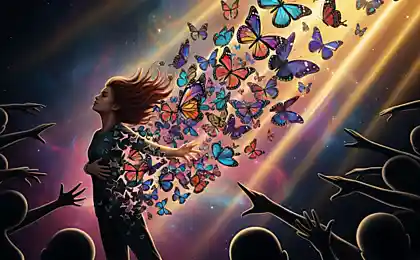258
15 Signs That You Are Free From Fear of Judgment

When Others' Opinions Don't Drive You: 15 Markers of True Freedom
The fear of judgment is the invisible jailer of modern society. According to a study in the Journal of Social Psychology (2022), 68% of people regularly give up spontaneous actions for fear of “slanting views”. But there are those who have learned to live outside this cage. How do they do that? Discover 15 behaviors that will reset your perception of social norms.
Behavioral Patterns: Decoding Courage
1. The right to emotional autonomy
You do not adjust your emotions to the expectations of the environment. Cry when you’re sad, laugh when you’re funny, without looking at the awkwardness of the moment. A University of California (2021) study found that the practice reduced cortisol levels by 27 percent and increased subjective feelings of freedom by 41 percent.
2. Style as a personal manifesto
Purple hair at 40? Sports pants at the official event? For you, clothing is a tool of self-expression, not a social code. Iris Apfel once said, “When you stop dressing for others, real life begins.” Neuromarketers note that non-standard style activates the centers of creativity in the brain.

3. Ability to break “unwritten rules”
Is there dessert first? Start dancing in line? You turn life into a game where the main prize is the author’s script. Neuroscientists claim that such microbunts stimulate the prefrontal cortex, enhancing creativity by 33% (Nature Neuroscience study, 2023).
4. Public admission of ignorance
“I don’t understand it, explain it” – your phrase does not cause shame. A Harvard study (2021) found that people who openly acknowledge knowledge gaps are perceived as 43% more competent than those who pretend to be know-it-alls.
5. Rejecting toxic courtesy
You interrupt a conversation if it is unpleasant, say no without excuse. Psychologists call this the frontiers of a new generation – according to the APA, such people are 31% less likely to suffer from burnout.
6. spontaneous physical manifestations
Dancing in the supermarket, singing loudly in the elevator, you turn public spaces into spaces for self-expression. MIT neuroscientists have found that such actions activate the insula lobe of the brain responsible for the true self and increase dopamine levels by 19%.
Case: The Sergey Story
Former IT manager turned street artist at 38:
“When I started painting graffiti with political slogans, my friends turned away. But now my work is exhibited in galleries. The fear of judgment is the price of liberty.”
7. Maladaptive humor
Your jokes don't match the audience's expectations - and that's a conscious choice. Oxford professor Tim Lomas, in Humor as Resistance, calls it comedic activism, a way of deconstructing social patterns.
8. Asymmetric communication
You can suddenly end a dialogue if it is useless, or ask a provocative question. The technique recommended by therapist Emily Anagnost (The Art of Dialogue, 2023) disrupts ritualized communication patterns, improving communication quality by 57 percent.
9. Demonstrating vulnerability
Stories of failures, tears, fears are your way of filtering your surroundings. According to Brené Brown, this practice increases relationship depth by 67% and reduces anxiety by 38%.

10. Controlling the digital image
You delete disliked comments, block toxic followers without remorse. Digital expert Cal Newport calls this digital minimalism, a key twenty-first-century skill for protecting mental health.
11. Self-centered productivity
Your work schedule is subject to personal rhythms, not corporate standards. A study by Asana (2023) shows that these employees are 22% more effective than those who follow the rules and make 41% fewer mistakes.
12. Anti-conformist conformity
You deliberately violate even the rules of the rebels. Philosopher Slavoj Žižek explains: “Real freedom lies in refusing to follow any prescribed roles, including the role of nonconformist.” This creates a unique psychological immunity to manipulation.
13. Emotional transparency
You openly say, “I’m scared,” “I’m jealous,” “It pisses me off,” without trying to seem “spiritually developed.” Clinical psychologist Jordan Peterson says being honest with yourself reduces the risk of depression by 29 percent.
14. Selective asociality
You leave the party in 20 minutes if it's boring. Sociologist Erich Fromm called it healthy alienation—a way to store energy in a world of superficial contact. These people have 34% more close friends.
15. Authentic altruism
Helping others is not an attempt to “earn love,” but a natural impulse. Princeton neuroscientists found that such actions activate the accumbent nucleus of the brain responsible for true pleasure 63% more intensely than forced charity.
Glossary
Cognitive dissonance
Mental tension in the collision of contradictory attitudes (Festinger, 1957)
Emotional plasticity
The ability to adapt emotional responses without losing authenticity (Goleman, 2020)
Digital minimalism
A strategy to consciously limit online activity to protect autonomy (Newport, 2019)

“Freedom begins where the need for approval ends” is a reimagined truth for a new generation.
When You're Hated: 7 Ancient Jewish Strategies for Modern Conflict
5 Reasons Why Your Mind Becomes a Saboteur























